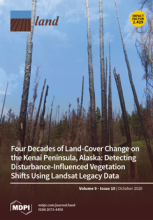Land Library
Welcome to the Land Portal Library. Explore our vast collection of open-access resources (over 74,000) including reports, journal articles, research papers, peer-reviewed publications, legal documents, videos and much more.
/ library resources
Showing items 1 through 8 of 8.Planning the adaptation of agriculture and forestry landscapes to climate change remains challenging due to the need for integrating substantial amounts of information.
There is an urgent need for a global transition to sustainable and wildlife-friendly farming systems that provide social and economic equity and protect ecosystem services on which agriculture depends.
Forests managed by Indigenous and other local communities generate important benefits for livelihood, and contribute to regional and global biodiversity and carbon sequestration goals. Yet, challenges to community forestry remain.
Knowledge transfer depends on the motivations of the target users. A case study of the intention of Indonesian coffee farmers to use a tree canopy trimming technique in pine–based agroforestry highlights path-dependency and complexity of social-ecological relationships.
Nine Latin American countries plan to use silvopastoral practices—incorporating trees into grazing lands—to mitigate climate change. However, the cumulative potential of scaling up silvopastoral systems at national levels is not well quantified.
Smallholder farmers and indigenous communities must cope with the opportunities and threats presented by rapidly spreading estate crops in the frontier of the agricultural market economy.
A letter from the Prime Minister dated 16 January 2008, and cited in the Constitution Court Ruling No 15/2552, in defense of the Community Forest Bill shows how “community rights” are often seen as contingent upon the responsibility of the communities to take care of the forest.
Rural development in the uplands of Lao Peoples’ Democratic Republic (Lao PDR) has presented many challenges for farmers and their communities. Lao government policy is directed at reducing the production of upland rice and providing sustainable alternative livelihoods for upland farmers.






